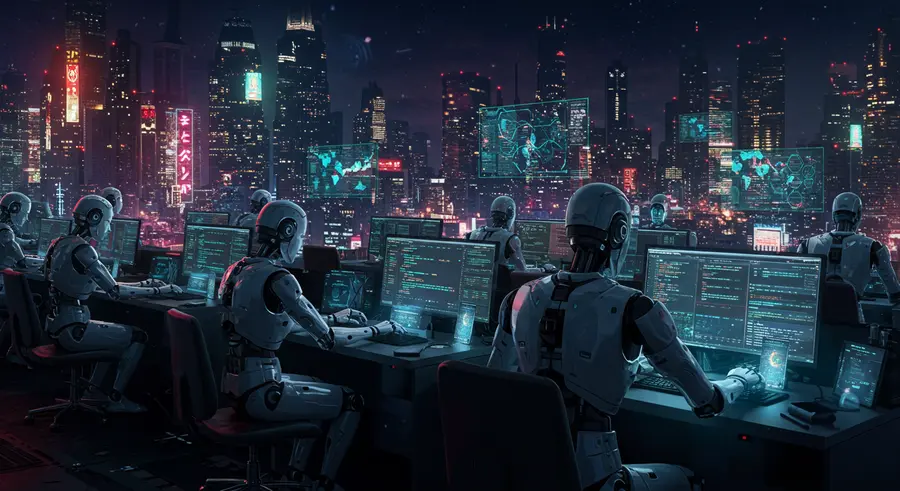
In the rapidly evolving landscape of the 21st century, Artificial Intelligence (AI) stands as a transformative force, fundamentally reshaping industries and daily life. Its impact on software development is particularly profound, ushering in an era of unprecedented efficiency, innovation, and complexity. This article delves into how AI is making a quantum leap in the way we conceive, create, and deploy software.
### The Dawn of AI-Assisted Coding
Gone are the days when coding was solely a human endeavor. AI-powered tools are now integral to every stage of the software development lifecycle. From intelligent code completion and error detection to automated refactoring and testing, AI is augmenting developers’ capabilities, allowing them to focus on higher-level problem-solving and creative design.
**Key AI Applications in Coding:**
* **Intelligent Autocompletion:** Tools like GitHub Copilot, powered by large language models, predict and suggest entire lines or blocks of code, dramatically speeding up development.
* **Automated Debugging and Testing:** AI algorithms can analyze code for potential bugs, generate test cases, and even fix errors autonomously, ensuring higher code quality and reducing time-to-market.
* **Code Refactoring:** AI can identify inefficient or redundant code patterns and suggest optimized alternatives, leading to more performant and maintainable applications.
### AI in Software Design and Architecture
AI’s influence extends beyond just writing code; it’s revolutionizing the very design and architecture of software systems. AI can analyze vast amounts of data to identify optimal architectural patterns, predict future performance bottlenecks, and even recommend technology stacks. This data-driven approach leads to more robust, scalable, and secure applications.
**Impact on Design:**
* **System Optimization:** AI can simulate various architectural configurations to determine the most efficient and cost-effective solutions.
* **Security Vulnerability Prediction:** Machine learning models can analyze past security breaches and code patterns to predict and prevent future vulnerabilities.
* **User Experience (UX) Enhancement:** AI can analyze user behavior data to inform UX design decisions, leading to more intuitive and engaging applications.
### The Rise of Low-Code/No-Code Platforms Powered by AI
AI is a primary driver behind the proliferation of low-code/no-code platforms, democratizing software creation for non-developers. These platforms leverage AI to enable users to build complex applications with minimal or no traditional coding, using visual interfaces and drag-and-drop functionalities.
**Benefits of AI-Powered Low-Code/No-Code:**
* **Accelerated Development:** Rapid prototyping and deployment of applications.
* **Reduced Technical Debt:** AI can generate clean, efficient code in the background, minimizing technical debt.
* **Empowerment of Citizen Developers:** Business users can create custom solutions tailored to their specific needs without relying on IT departments.
### Challenges and Ethical Considerations
While the benefits are undeniable, the integration of AI into software development also presents challenges. Concerns around job displacement, the ethical implications of autonomous code generation, and the potential for AI to perpetuate biases present critical areas for ongoing discussion and responsible development.
**Key Challenges:**
* **Job Evolution:** Developers will need to adapt their skill sets to collaborate effectively with AI tools, shifting towards more strategic and oversight roles.
* **Algorithmic Bias:** If training data for AI models is biased, the generated code or design recommendations could inadvertently perpetuate those biases.
* **Security and Control:** Ensuring the security and integrity of AI-generated code and maintaining human oversight remains paramount.
### The Future of Software Development
The quantum leap AI is driving in software development is just the beginning. We can anticipate even more sophisticated AI tools that will:
* **Proactively fix bugs before they occur.**
* **Generate entire applications from high-level natural language descriptions.**
* **Optimize software for specific hardware and performance requirements in real-time.**
The future of software development is one of symbiotic collaboration between human intelligence and artificial intelligence, leading to an era of unprecedented innovation and problem-solving. Developers who embrace AI as a powerful partner will be at the forefront of this exciting transformation, shaping the digital world in ways we are only just beginning to imagine.